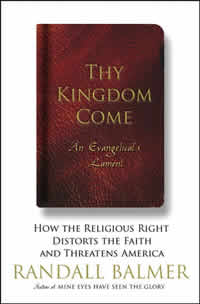Book Notes
 Randall Balmer, Thy Kingdom Come; An Evangelical's Lament. How the Religious Right Distorts the Faith and Threatens America (New York: Basic Books, 2006), 242pp.
Randall Balmer, Thy Kingdom Come; An Evangelical's Lament. How the Religious Right Distorts the Faith and Threatens America (New York: Basic Books, 2006), 242pp.
In addition to his credentials as a professor of American religion at Barnard College, Columbia University, Randall Balmer writes as an insider who was born, raised, and educated within conservative evangelicalism. In addition to affirming his evangelical identity, he also declares himself a political liberal. Balmer has written elsewhere how and why he remains grateful for his Christian heritage despite significance ambivalence (Growing Pains; Learning to Love My Father's Faith, and Mine Eyes Have Seen the Glory: A Journey into the Evangelical Subculture in America), but in his most recent book his ambivalence turns to acerbic vilification.
Evangelicalism's marriage to conservative politics, Balmer says, has poisoned public discourse, distorted the Gospel so that it barely resembles the message of Jesus, betrayed its nineteenth-century forbears who were in the vanguard of progressive causes like abolition, and alienated a sizeable number of fellow-evangelicals who have tired of explaining to their friends that their Christian faith "does not mean that we take our marching orders from James Dobson or Karl Rove." After a brief introduction he devotes successive chapters to the religious right's litmus tests —abortion, homosexuality, first amendment disestablishment (including the "Ten Commandments Judge" Roy Moore), school vouchers and public education, creationism, and the environment. Throughout his book Balmer argues that the right has often acted not out of moral principle but for political expedience. For example, school vouchers go overwhelmingly to religious schools and to wealthy people; would right wingers lobby for the issue so hard if vouchers were given only to families whose household income was below a certain threshold? Or again, if evangelicals really cared about abortion, why have they done so little about it, even though they have controlled the White House and Congress, or why have they been so silent about specifics (jail a doctor who performed an abortion?)? Instead of "pandering for power," Balmer calls evangelicals to the renunciation of power, for true religion, he believes, flourishes at the fringes. Instead of creating their own intellectual, cultural, and social ghettos, evangelicals ought to seek the common good of all society.
I happen to agree with Balmer on many issues, but his book suffers from its polemical tone. In the last few pages, for example, he disses the "minions" and "bloviating preachers" of the religious right who, he is sure, will vilify him for his brave honesty. His patronizing style, though, only plays into the hands of the people he might have reached, and so decreases his readership and entrenches stereotypes on both sides. Balmer also neglects material that does not fit his simple narrative. I appreciated his argument that most evangelicals did not object to abortion because of Roe v. Wade, but some important figures like HOJ Brown and Francis Schaeffer surely did, and very early on. Intelligent design has problems, but that does not mean Marsden is wrong about hostility toward the faith in secular universities (at least according to my friends at Stanford), or that eminent scholars like John Polkinghorne do not have good things to say about the anthropic principle. Some of his anecdotal examples strike me as fringe, even if scary. At one point he does give credit where it is due, acknowledging the important, if late, change of mind among some evangelicals about environmental concerns; he even suggests that environmental causes might be the wedge that separates conservative believers from conservative political ideology.
I regretted Balmer's sarcastic tone because we need the right to read people like him, and like the more balanced treatments of similar material by Jon Meacham (American Gospel), Jim Wallis (God's Politics: Why the Right Gets It Wrong and the Left Doesn't Get It), and pastor Gregory Boyd (The Myth of a Christian Nation: How the Quest for Political Power Is Destroying the Church). Unlike Balmer, the latter two books affirm that the Gospel judges all political ideologies, left or right. I wish Balmer success in his mission to "slay the dragon of the religious right," and I agree with him that our country would be better for it. But his chances for success would have improved if he had avoided sarcasm and sanctimony.


